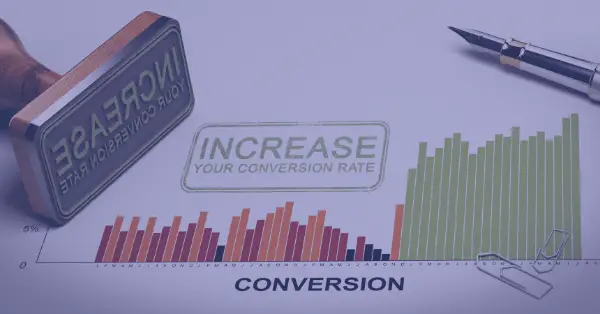CVR Marketing: A guide to measure & improve conversion rates
Being a novice in the world of digital marketing is packed with challenges, from trying to understand different terms to decipher countless abbreviations.
You must’ve heard about CVR marketing, which stands for conversion rate marketing. But what is this strategy, and how can it step up your game?
In this brief guide, we answer those questions in detail, so let’s dive in!

What Is CVR Marketing?
In short, CVR marketing refers to a strategy that a company or business follows to improve the conversion rate of its customers. Conversions can translate to any specific desired actions that the company wants the customers to do, including:
- Making a purchase
- Signing up for a newsletter
- Completing a certain task, e.g. clicking a button, visit a specific page, stay a certain time on a site.
- Subscribing to a service
- Contacting the company via email, phone, etc.
- Engaging with any form of digital content
- Downloading a piece of relevant software, like a brand’s app
- Filling out a form or survey
In other words, the marketing team tries to find ways to make those conversions happen, using the help of different digital marketing approaches.
Conversion Rate Optimization Marketing Formula
Of course, to calculate the conversion ratio, there’s a specific CVR formula that marketers use to figure out how their conversion rates are doing. It’s fairly simple math!
If you’re in a rush, here’s a quick overview of the conversion rate optimization formula:
(Total conversions/total impressions or clicks) x 100
The conversion rate is calculated by dividing the conversions total by the total number of impressions, clicks, visitors, number of users, etc. Then, you’ll have to multiply the resulting number by 100 to get a percentage that represents the conversion rate.
Let’s give you an example. Say that you’ve put up an ad on Google, and the target of that advertising campaign is to direct people to subscribe to a service that you’re marketing.
In this case, the action of clicking on the ad represents the “impression” in the formula.
On the other hand, subscribing to the service is viewed as the “conversion.” So, here, you’ll have to divide the number of ad clicks by the overall number of subscriptions to get your conversion rate.
Afterward, all that’s left to do is multiply by 100 to get your conversion percentage.
Example:
300 clicks on an ad
12 subscribers
Conversion rate = 4 %
How Are Conversions Tracked in CVR Marketing?
Just like the case with every step of digital marketing campaigns, counting the number of conversions in CVR is done via an automated tracking tool.
The main job of this computer software is to measure the data left after web users take certain actions and translate it into conversions and impressions. After that, the marketing team analyzes these numbers to get the conversion rate out of each marketing campaign.
Some tools track conversions and give you their rates automatically, such as the Google Ads optimization tool.
By taking this ratio into account, marketers will be able to know whether their campaign was effective in reaching its intended goal. This way, they can make informed decisions in the future, allocate budgets differently, adjust their approach to generate more conversions, and optimize their strategy.
What Are the Benefits of Using CVR Marketing?
CVR marketing works hand-in-hand with other digital marketing strategies to give marketers important data about their performance. Using this data, they can optimize their campaign to try and increase conversions.
Other benefits of using CVR marketing include:
- Generates leads
- Determines the degree of a marketing campaign’s success
- Helps the company or business improve certain product or service aspects
- Increased conversion rates mean increased revenue
It’s also important to not get blindsided by vanity or leading KPIs like cost per clicks. Facebook ads, for instance, may have lower CPCs but a LinkedIn Account Based Marketing campaign may have higher conversion rates and produce better lead quality.
Related KPIs
There are related campaign metrics for online marketing:
Final Words
CVR marketing is one of the most successful digital marketing approaches that you must learn about if you wish to enter this world.
In a nutshell, this strategy focuses on measuring the ratio at which users perform a task desired by a company, then using this number to improve the experience of customers.

Sascha is a Lifecycle Marketing Consultant with over 8 years of digital marketing experiences in Silicon Valley, the UK, and Germany.
After leading the demand generation for a 100+ million company, he decided to venture out on himself. He’s now helping clients to attract and convert more leads and customers.
His main focus are SEO, paid media & marketing automation – all with the focus to tie marketing campaigns to revenue.
Sascha has been featured in industry publications.




